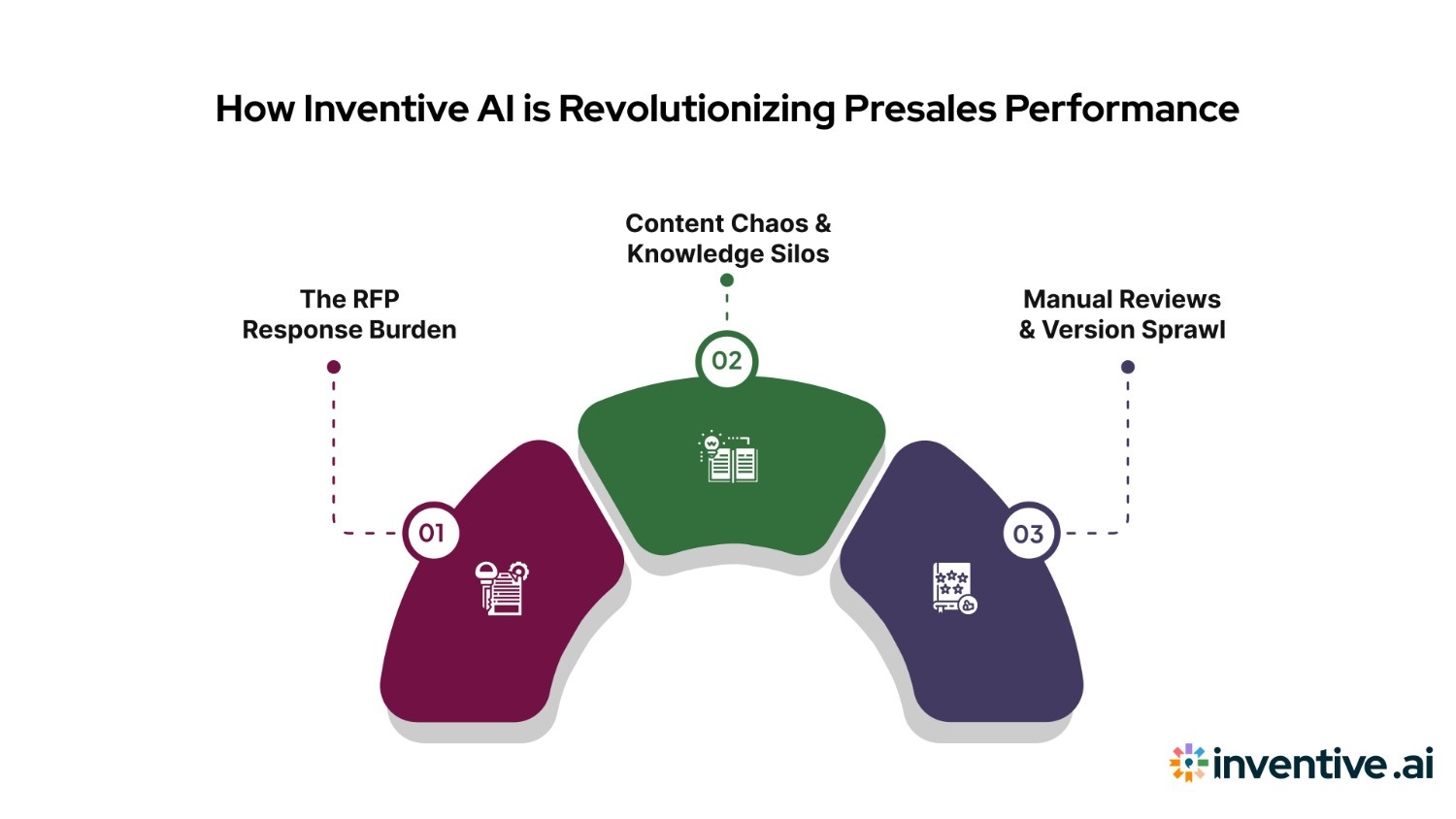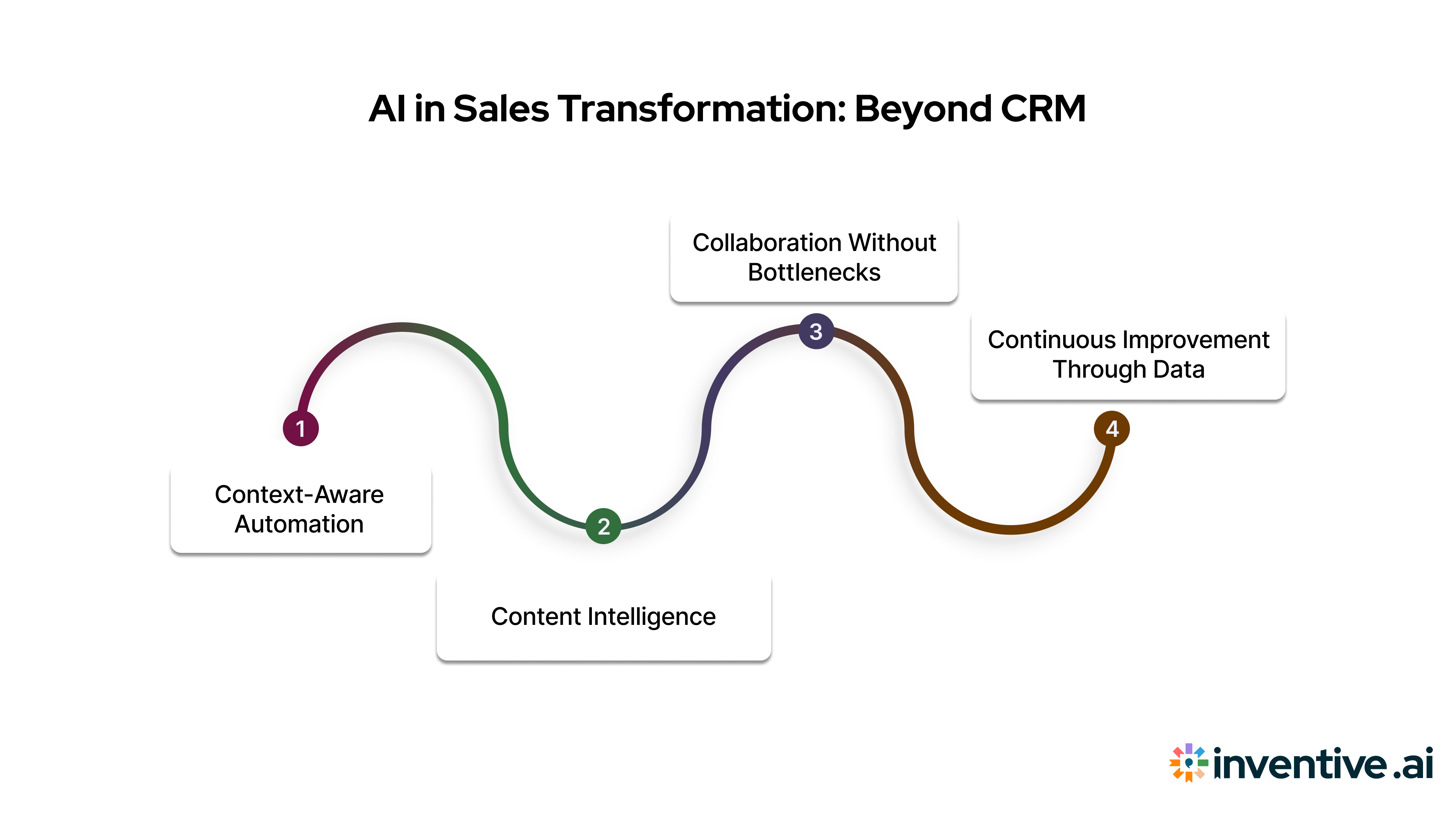AI for Sales Transformation That Accelerates Every Stage at Scale
In this blog, we’ll explore how AI eliminates manual bottlenecks, streamlines proposal workflows, and accelerates deal cycles, helping sales leaders move from reactive selling to predictable growth.

Sales transformation starts when friction leaves the process. Most teams still lose hours building proposals, chasing input, and managing outdated content, all of which slow down deal progress. These invisible delays cost opportunities and reduce revenue efficiency.
AI for sales transformation changes how teams operate by automating repetitive work, organizing knowledge, and improving collaboration across sales functions. By handling time-consuming tasks, AI frees sellers to spend more time with customers, and early adopters are already seeing win rate improvements of 30% or more.
In this blog, we’ll explore how AI eliminates manual bottlenecks, streamlines proposal workflows, and accelerates deal cycles, helping sales leaders move from reactive selling to predictable growth.
Key Takeaways
- AI eliminates sales friction. Automating proposals and reviews shortens deal cycles and improves response consistency.
- Centralized knowledge builds speed. Unified content access lets teams reuse accurate information instantly.
- Accuracy drives results. Verified data and AI checks boost proposal quality and win rates.
- Adoption defines success. AI delivers ROI only when fully integrated into daily sales workflows.
The Hidden Bottlenecks Slowing Sales Transformation
Even the most advanced sales strategies fail when internal workflows don’t keep up. Sales transformation often stalls because teams still rely on manual, disconnected processes that limit deal momentum.

1. Fragmented Sales Operations
Leads, opportunities, and deal insights often live across disconnected platforms, CRM, email, spreadsheets, and shared drives. Without a unified view, revenue leaders can’t forecast accurately or track real-time deal progress.
2. The RFP Response Burden
Creating a single RFP response can take over 23 hours of manual work. Each draft involves searching for answers, reformatting content, and waiting for subject-matter approvals, slowing deal cycles by days or weeks.
3. Content Chaos and Knowledge Silos
Information sits across drives, emails, and tools. Without a single source of truth, teams duplicate work and repeat errors that damage accuracy and consistency.
4. Manual Reviews and Version Sprawl
Multiple contributors editing in isolation leads to version confusion, misalignment, and missed deadlines.
5. Slow Cross-Functional Collaboration
Sales, presales, and solution teams often work in silos. Feedback loops through long email chains and manual reviews lead to delays and version confusion.
6. Lack of Data Intelligence
Key sales data is underused. Teams have the numbers, pipeline size, engagement, and win rates, but not the insights to act fast or pivot strategy mid-cycle.
7. Reactive, Not Predictive, Sales Cycles
Without AI-driven visibility, teams rely on gut feeling to qualify deals, prioritize accounts, and allocate effort. That slows growth and reduces conversion quality.
These bottlenecks keep revenue operations reactive instead of scalable. AI for sales transformation directly addresses these inefficiencies, replacing manual friction with automation and precision.
To see how modern revenue teams are applying these principles in real-world workflows, explore our AI-Powered RFP Automation Sales Solutions page.
AI for Sales Transformation, Beyond CRM Automation
Most organizations see “sales transformation” as a technology upgrade, new CRMs, dashboards, or communication tools. But true transformation isn’t about adding systems; it’s about creating intelligent workflows that remove friction and let sales teams focus on selling.
AI for sales transformation goes beyond traditional automation by bringing intelligence into every step of the process. Instead of managing data, AI uses it to guide actions, anticipate needs, and streamline decisions.

Here’s how it redefines the sales function:
1. Context-Aware Automation
AI doesn’t just record activity, it understands it. From proposal creation to lead qualification, AI tools learn patterns and automate repetitive tasks, saving time without losing accuracy.
2. Content Intelligence
Sales teams often reuse old proposals or outdated messaging. AI organizes and refreshes content automatically, ensuring every communication reflects the latest brand positioning and customer insight.
3. Collaboration Without Bottlenecks
AI connects teams across sales, presales, and proposal functions. By centralizing shared data, everyone works from the same verified information, eliminating duplicate effort and confusion.
4. Continuous Improvement Through Data
AI captures and analyzes every response, identifying what works and what doesn’t. Over time, it builds a smarter, more predictable sales process.
While most transformation efforts stop at CRM automation, AI extends far beyond, driving consistency, improving accuracy, and turning fragmented operations into cohesive, revenue-ready systems.
Learn how proposal management software strengthens collaboration and reduces review time in our guide on Proposal Management Software for Sales Processes.
How AI Transforms the Sales Process
AI doesn’t just speed up existing workflows; it reshapes how sales teams identify, pursue, and win opportunities. From the first interaction to the final proposal, AI for sales transformation adds structure, accuracy, and intelligence to every stage of the funnel.

1. Top-of-Funnel: Smarter Prospecting and Qualification
Finding quality leads has always been a numbers game. Most sales teams still rely on basic filters or manual scoring, which can overlook high-potential prospects.
AI changes that by:
- Analyzing buyer intent signals across digital channels to identify active interest.
- Ranking prospects dynamically based on fit, behavior, and historical success rates.
- Predicting buying readiness through pattern recognition in previous deals.
This allows sales teams to focus their time on accounts most likely to convert, improving lead-to-opportunity ratios and saving hundreds of hours each quarter.
2. Mid-Funnel: Intelligent Collaboration and Content Precision
At this stage, speed and accuracy determine who advances to negotiation. Yet, most teams lose momentum because of scattered information and manual coordination.
AI strengthens the middle funnel through:
- Centralized knowledge management: Teams access the same verified information, reducing back-and-forth.
- Context-aware recommendations: The system suggests content proven to resonate with similar buyers.
- Real-time collaboration: Integrations with tools like Slack and Microsoft Teams allow seamless input from presales, solutions, and legal teams.
Result: consistent messaging, faster turnaround times, and a unified voice across every proposal.
3. Bottom-of-Funnel: RFP Automation and Deal Acceleration
Proposal creation is where many deals stall, not because of pricing, but because of process. A single RFP can take over 30 hours to complete manually, requiring input from multiple departments.
AI-driven proposal automation removes this barrier by:
- Generating first drafts instantly from approved content repositories.
- Ensuring accuracy and compliance with automatic content validation.
- Highlighting missing information or weak sections to strengthen responses before submission.
- Standardizing tone and structure so every proposal aligns with brand and messaging standards.
By turning a 30-hour process into a 2-hour workflow, AI for sales transformation frees teams to spend more time closing, not formatting.
Outcome: A Connected, Predictable Sales Cycle
When every stage of the funnel is connected through AI, sales teams operate with greater focus and less friction.
Leads are qualified with precision, proposals are created in minutes, and collaboration happens naturally, all resulting in shorter sales cycles and stronger customer trust.
Transforming Proposal and RFP Operations With AI
Few parts of the sales cycle drain more time than RFP responses. On average, a single enterprise proposal consumes 21–50 hours of manual work, involving multiple contributors and endless revisions. These inefficiencies not only delay deals but also weaken consistency and brand trust.
AI-powered RFP automation changes this dynamic. It turns one of the most complex processes in B2B sales into a fast, predictable, and scalable workflow.
1. From 23 Hours to 2 Hours: The Shift to Instant Drafting
AI analyzes previous responses, approved knowledge bases, and customer context to create a first draft in minutes. This removes the need to start from scratch and ensures that responses reflect verified, on-brand messaging.
Impact:
- Proposal creation time reduced by up to 90%
- Faster internal review and submission cycles
- More bandwidth for strategic, high-value tasks.
2. Centralized Knowledge Hub for Content Reuse
In traditional RFP management, content is stored across drives and email threads. AI centralizes all approved information into a searchable knowledge hub.
What it enables:
- Instant access to accurate answers and historical data
- Version control that ensures teams always use the latest information
- Consistent language and compliance across every document.
This turns every past proposal into an asset, not a lost file.
3. Automated Quality Control and Accuracy Checks
AI continuously scans proposals for outdated or conflicting content. It also ensures formatting, tone, and compliance match organizational standards.
Results:
- 95% response accuracy through verified data sources
- Elimination of manual proofreading loops
- Fewer last-minute errors or inconsistencies.
4. Knowledge Intelligence That Learns With Every Response
Each RFP cycle teaches the system what works, improving response quality over time. AI tracks winning themes, preferred formats, and commonly used answers, building a smarter, more effective knowledge base.
Long-Term Benefit: Every proposal becomes faster, sharper, and more aligned with what closes deals.
5. Measurable Business Impact
Companies using AI-driven RFP automation report:
- Up to 50% higher win rates
- Shorter deal cycles across complex accounts
- Improved collaboration between sales, presales, and proposal teams
AI transforms RFPs from administrative tasks into strategic tools. What once took weeks now takes hours, creating a competitive edge where speed, accuracy, and customer alignment define success.
If you’re evaluating automation tools, here’s what to look for in Sales Proposal AI to Transform Your RFP Process.
AI-Powered Sales Productivity and Deal Velocity
Sales teams lose a significant share of their time to coordination, data entry, and content searching, not selling. These hidden tasks drain productivity and slow deal movement across the pipeline.
AI for sales transformation changes this by reducing manual work and giving teams the clarity, context, and tools they need to move faster.
.png)
1. Eliminating Administrative Overload
Repetitive tasks like formatting proposals, chasing inputs, and verifying details add hours to every deal.
AI automates these low-value steps, from populating proposal templates to retrieving approved content, allowing sales teams to focus on client strategy and deal positioning.
Result: More selling time, less administrative drag.
2. Accelerating Deal Velocity
Manual proposal reviews, handoffs, and corrections often delay submissions.
AI connects everyone involved in sales, presales, and subject-matter experts through centralized workflows, ensuring faster collaboration and approvals.
Result: Shorter response cycles and smoother deal progression.
3. Smart Prioritization and Pipeline Optimization
AI analyzes engagement patterns and deal history to highlight opportunities most likely to close. It helps teams identify stalled deals early and refocus on accounts with higher revenue potential.
Result: More predictable forecasting and healthier pipelines.
When administrative friction disappears, productivity compounds across the entire sales cycle. With automation managing the details, teams close deals faster, collaborate better, and create consistent momentum, the foundation of sustained sales transformation.
Want to explore other ways AI can accelerate your team’s productivity? Check out 10 AI Tools Every Sales Team Should Use.
Measuring the ROI of AI Sales Transformation
Sales transformation delivers its value when the results are visible, measurable, and tied to business outcomes. AI impacts four key performance areas: time, accuracy, velocity, and cost, giving sales leaders a clear picture of return on investment.
Key ROI Metrics for AI in Sales Transformation:
Tracking these metrics helps sales leaders link AI’s performance directly to revenue growth. The result isn’t just faster workflows, it’s smarter selling, improved predictability, and stronger bottom-line performance.
Overcoming Common AI Sales Transformation Challenges
AI adoption brings measurable value, but the transition often exposes organizational and operational hurdles. Here are the most common challenges, and how leading teams solve them.
- Resistance to Change: Teams worry that automation will disrupt established workflows.
- Start small. Launch pilot use cases to demonstrate quick wins and build trust.
- Data Quality and Accessibility: Incomplete or inconsistent data limits AI accuracy.
- Centralize and clean data before implementation to ensure reliable outcomes.
- Tool Integration Complexity: Fragmented systems create information silos.
- Integrate AI with existing CRMs, proposal tools, and collaboration platforms for unified workflows.
- Skill Gaps and Enablement: Sales teams often lack familiarity with AI-driven tools.
- Invest in short, role-based training to drive adoption and confidence.
- Balancing Automation and Human Oversight: Over-automation risks losing personalization.
- Define ownership clearly: AI handles process, humans handle persuasion.
- Measuring Early ROI: Without clear metrics, success feels abstract.
- Track core KPIs: time saved, accuracy rate, and win rate improvements.
When challenges are anticipated and structured into the rollout, AI adoption becomes smoother, turning skepticism into performance gains.
For expert perspectives on integrating AI across sales teams, listen to our podcast: How Sales and Go-to-Market Leaders Should Navigate AI Evolution.
How Inventive AI Accelerates Sales Transformation
Sales transformation depends on speed, consistency, and collaboration, the three areas where Inventive AI delivers the greatest impact.

- AI RFP Agent: Automates proposal drafting using verified company data, cutting response time by up to 90% while maintaining brand consistency.
- Knowledge Hub: Centralizes content from systems like SharePoint, Google Drive, and Slack, giving teams instant access to accurate, approved information.
- AI Content Manager: Detects outdated or conflicting content, ensuring every response meets current standards with 95% accuracy.
- Win Themes: Identifies what works in successful proposals and applies those insights across future submissions, helping teams achieve up to 50% higher win rates.
With these capabilities working together, Inventive AI turns RFPs from manual bottlenecks into strategic assets, helping sales and revenue teams close deals faster, reduce rework, and scale without added headcount.
The Future of AI-Driven Sales Teams
Sales teams are entering a phase where data, automation, and intelligence work in unison. The next evolution of sales transformation won’t focus on more tools; it will focus on smarter alignment between people, processes, and technology.
Here’s what defines the future of AI-driven sales organizations:
- Connected Revenue Ecosystems: CRMs, RFP platforms, and enablement tools will operate as one ecosystem, giving sales leaders full visibility from opportunity to renewal.
- Adaptive AI Models: Sales systems will continuously learn from performance data, refining proposals, messages, and outreach strategies based on real-world outcomes.
- Human-Centered Selling: AI will handle data-heavy, repetitive work so teams can focus on empathy, trust-building, and customer relationships, the parts that win deals.
Organizations that embrace AI early will lead not because of automation, but because they create the most agile, insight-driven sales experiences.
Explore the human side of AI-enabled selling in our episode Revolutionizing B2B Sales With Empathy.
Conclusion
Sales transformation doesn’t start with more software; it starts with removing what slows your team down. AI makes that possible by automating the manual layers that consume hours, reduce accuracy, and delay revenue.
With AI-driven proposal automation, centralized content management, and intelligent knowledge reuse, sales teams work faster, stay aligned, and deliver consistent results across every opportunity.
Organizations adopting AI for sales transformation are already seeing faster deal cycles, higher win rates, and stronger customer confidence. The shift isn’t about replacing people, it’s about empowering them to sell smarter and execute with precision.
Book a Demo. See how Inventive AI helps your sales team respond faster, collaborate better, and accelerate every deal with confidence.
What Customers Say About Inventive AI:
FAQs
1. Does AI replace sales professionals?
No. AI supports sales teams by automating repetitive work, organizing information, and improving accuracy. It gives sales professionals more time to focus on customer relationships, strategy, and closing deals, not replacing, but enhancing their role.
2. Is AI only useful for large enterprises?
No. AI solutions scale easily for businesses of all sizes. Mid-market and enterprise sales teams alike benefit from faster responses, improved collaboration, and higher proposal accuracy through automation tailored to their operations.
3. Does implementing AI take months or a heavy IT setup?
Not anymore. Modern AI tools integrate quickly with existing systems like CRMs and content repositories. Most teams can start automating workflows and proposals within days, without major technical effort or infrastructure changes.
4. Will AI make proposals sound generic or robotic?
No. AI uses verified company data and brand-approved messaging to maintain your tone and accuracy. Teams still review and personalize responses, ensuring proposals feel authentic and aligned with your customers’ needs.
5. Is AI too complex for sales teams to use daily?
No. AI platforms are designed for simplicity and collaboration. They automate background processes, suggest content, and assist drafting — letting sales teams work faster without needing technical expertise or constant manual oversight.

90% Faster RFPs. 50% More Wins. Watch a 2-Minute Demo.
After witnessing the gap between generic AI models and the high precision required for business proposals, Gaurav co-founded Inventive AI to bring true intelligence to the RFP process. An IIT Roorkee graduate with deep expertise in building Large Language Models (LLMs), he focuses on ensuring product teams spend less time on repetitive technical questionnaires and more time on innovation.
Understanding that sales leaders struggle to cut through the hype of generic AI, Mukund focuses on connecting enterprises with the specialized RFP automation they actually need at Inventive AI. An IIT Jodhpur graduate with 3+ years in growth marketing, he uses data-driven strategies to help teams discover the solution to their proposal headaches and scale their revenue operations.


.jpeg)